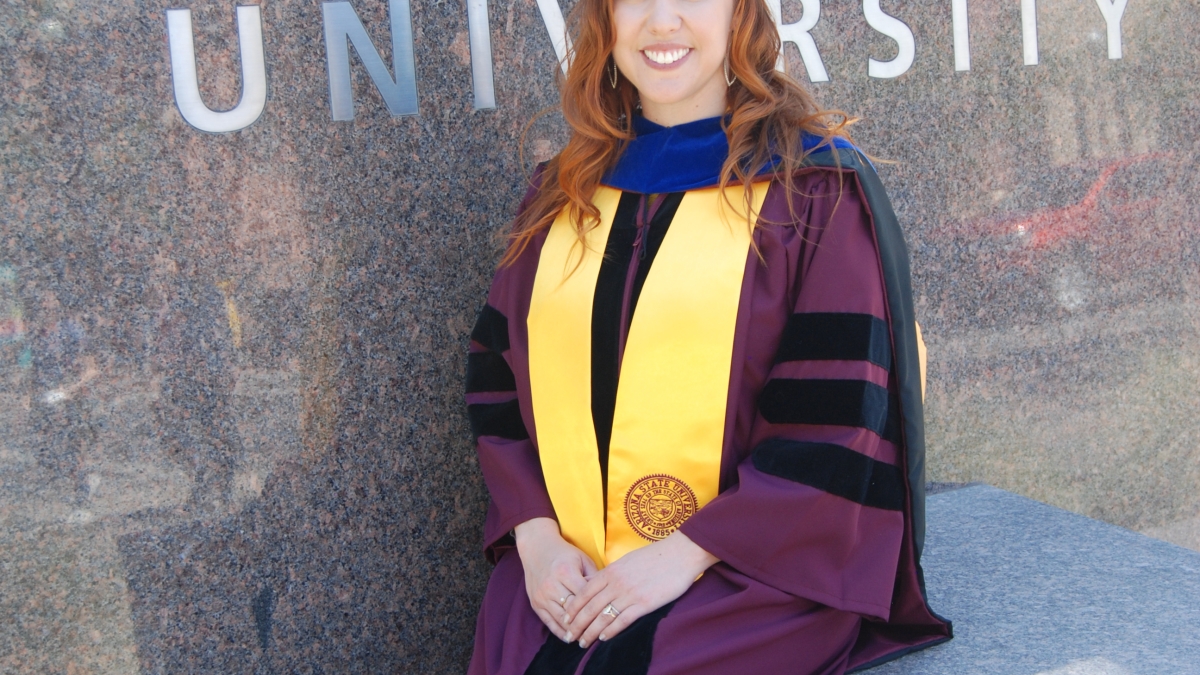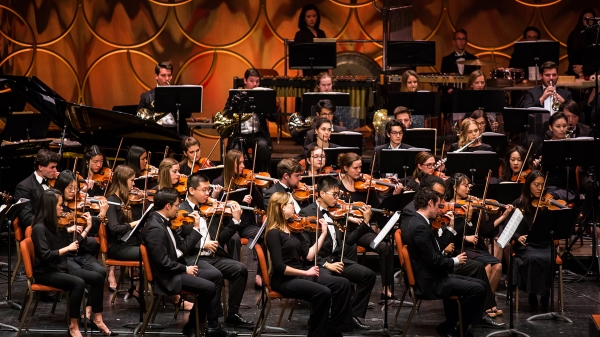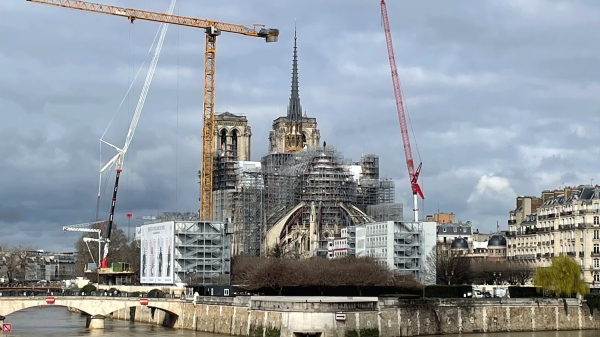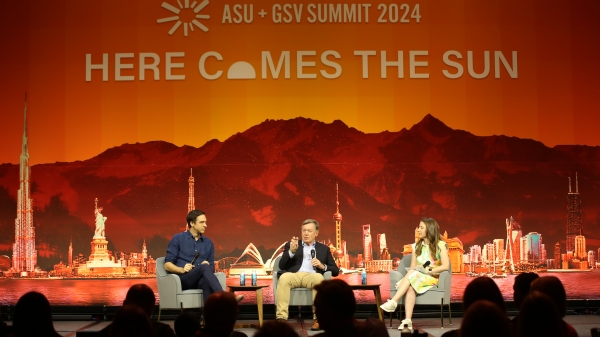‘This is not a solo journey’: ASU grad talks linguistic compassion

Sarah Elizabeth Snyder is graduating with a PhD in English (writing, rhetorics and literacies) this spring. Her main advice for her fellow students? "Find topics that invigorate you, and people who challenge you and encourage you."
Editor’s note: This is part of a series of profiles for spring 2018 commencement.
Graduating doctoral student Sarah Elizabeth Snyder earned a special recognition recently during her post-dissertation defense photo op: She was the first newly minted PhD so excited to finish that she was unable to keep still for the camera. (The photographer acquiesced by taking a video instead.)
This wasn’t entirely surprising. Movement defines Snyder — a samba dancer and self-described overachiever. The Tempe, Arizona, native has been zooming through language studies since her days as an undergrad in ASU’s literature, writing and film program. She began working on her PhD in the Department of English’s writing, rhetorics and literacies program after earning two master’s degrees at Northern Arizona University: one in teaching English as a second language (TESL) and the other in rhetoric and the teaching of writing. With that combined knowledge and a burst of charismatic energy, she created her own track studying second-language writing, or as she puts it “the act of performing academic writing in English while simultaneously learning the English language.”
Snyder is a born teacher, radiating compassion toward all in her sphere. Snyder’s mentors agree that she is a positive force both in the classroom and among her peers. “Her ability to network and connect people — both junior and senior scholars — is outstanding,” said Paul Kei Matsuda, a professor of English and co-chair of Snyder’s dissertation committee. “She also has been a productive scholar publishing book chapters based on her studies and presenting at various conferences.”
For her numerous mentoring and scholarly activities, Snyder has distinguished herself with several awards and accolades, including the Carl C. Carlie Linguistics Fellowship (2015-2016) and the Outstanding Paper on Second Language Writing Award (2017) from the Department of English, a Dissertation Completion Fellowship from the Graduate College, and awards for teaching (2015) and research excellence (2016) from the Graduate and Professional Student Association (GPSA).
In an interview for ASU Now, Snyder talked about sharing the burden of communication, the problem with linguistic profiling, and trying to be a little gentler with herself during the PhD quest. (She may have been dancing while she answered these questions.)
Question: What was your “aha” moment, when you realized you wanted to study in your field?
Answer: I actually had two "aha" moments. The first was as an undergraduate as I was working toward a degree in nutrition. I was asked to work in the Writing Center to help my nutrition program colleagues write better. I started to work with international students there, and students who spoke a language other than English dominantly. When I realized that they were concurrently learning English and the material from their classes (e.g., chemistry, nutrition, stats), I was amazed. I was having a hard enough time in chemistry (in English, as a native English speaker), and I thought to myself, "How on earth can anyone do this?" Of course, these students must show some English language proficiency before coming to university, but I saw the areas in which these students needed language support, and I wanted to help provide it.
The second "aha" moment was when I went to Japan to teach English as a foreign language (EFL) with the JET Programme shortly after graduating from my undergraduate program [in ASU’s College of Integrative Arts and Sciences] in 2009. I had been working in the Writing Center for three years at that point, and I felt comfortable explaining language and grammar to students. I thought that I was experienced enough to do this job.
When I arrived in Japan, I had what I thought was a very similar language learning experience to the ESL and international students at ASU — being immersed in Japanese and trying to operate in a professional context that required Japanese while learning Japanese. Except that I knew no Japanese. I was overwhelmed. I also felt overwhelmed trying to teach ESL courses without any formal ESL training to Japanese high school students. Everything up to that point had implied that because I was a native speaker of English, of course I could teach English easy-peasy.
Through these experiences, I saw how important language learning and learning how to write are to the success of our extremely literate world — and how important being properly trained to do it was! It was impressed upon me that both language precision and writing skill have a direct impact on upward mobility. Being a skilled writer could be the difference between getting your dream job and taking whatever you can get. I decided then to find MA and PhD programs that gave me more opportunities to help people learn language and writing.
Q: What’s something you learned while at ASU — in the classroom or otherwise — that surprised you, that changed your perspective?
A: One of the most surprising things that I learned at ASU was the concept of World Englishes from Aya Matsuda. Everyone knows that there are differences between dialects of Australian English, or British English, and American English (in the field of World Englishes, these are called inner-circle Englishes), but what many don’t know is that there are also dialects of English from Singapore, India, (known as outer-circle Englishes) and many other countries which are not particularly known for speaking English. There is also a third type of English in what’s called the “expanding circle” that includes Englishes spoken by, for example, people from Japan, China and the Middle East. The concept that there are multiple varieties of English that can all be considered correct creates some confusion for people who haven’t been exposed to the plurality of Englishes.
Similar to how certain dialects of English within the United States (such as Southern English, New York English, African-American Vernacular English, and even Spanglish) are perceived differently, certain Englishes around the world are perceived in different ways. Some “sound” smarter and polite (what sociolinguists would call prestige dialects), and some sound less educated and even rude (what sociolinguists would call non-prestige dialects). Unfortunately for everyone, these perceptions turn into stereotypes, which play into institutionalized discrimination in the United States and across the world. This is called linguicism, or discrimination based on language.
I want to work on raising awareness of bias toward non-prestige dialects and responsibility for the burden of communication. The burden of communication is who gets tasked with the responsibility for clear communication, and who gets blamed for miscommunication or for the difficulty of communication. I think, currently, our foreign language requirement at ASU addresses this, and I would like to add the option for students to study World Englishes as a foreign language. This is a concept that I presented on at the International Association of World Englishes Conference at ASU in 2013.
When I find myself in these situations, as a language teacher and a good global citizen, I try to ask myself, "Did I understand what they said?" If the answer is yes, then I try not to worry too much about the delivery. If the answer is no, I take the responsibility for the burden of communication to find out what they mean by asking clarification questions.
Q: Why did you choose ASU?
A: Quite simply, the best in our field are here. Paul Kei Matsuda essentially developed the field of second language writing research, and I had created a rapport with him at a conference during my master's program. Shirley Rose is writing program administrator of the largest writing programs in the country. I feel very lucky that these two talented, inspiring, wonderful professors agreed to co-chair my dissertation. ASU also has strong programs in TESOL, applied linguistics, and rhetoric and composition, which was also material to me so that I could continue to learn in all of those fields.
Q: What’s the best piece of advice you’d give to those still in school?
A: This is not a solo journey. Find topics that invigorate you, and people who challenge you and encourage you. Find people who help you see your strengths as well as your weaknesses. It is imperative that your committee contains those people. I got very lucky!
Even if you are as lucky as I was, find a great therapist because this is a gargantuan journey and it will test you to the depths of your soul. Studies that describe the mental health crisis for graduate students are not hyperbolic. There will be multiple times when you realize the things you could have had or places you could have gone working any other job instead of this labor of love ... and if you haven't already gone to therapy, you're already behind in your recovery! You are trying to be a creator of knowledge through a PhD program, and creating new knowledge in this ever-connected, hyper-researched world is a daunting task.
Finally, this is not a competition with others. Just try to be a better you than you were yesterday. Often times people who pursue PhDs are perfectionists and/or "Type-A" personalities. Although it still pains me to say this in public — as a recovering perfectionist myself — the Voltaire aphorism, "perfection is the enemy of the good," helped me to be a little gentler with myself during this journey.
Q: What was your favorite spot on campus, whether for studying, meeting friends or just thinking about life?
A: ASU has so many unique spaces ... I remember writing many papers during winter break in front of the fireplace at the Memorial Union, or walking down Cady Mall and taking a moment to be mindful and smell the orange blossoms. On sweaty monsoon days when I would have to trek across campus, I always cut through the climate-controlled herpetological exhibit in the Life Sciences Building to say hi to my little scaly friends.
Perhaps my favorite place, though, is the Secret Garden. This sounds absurd now that there is a hefty premium for renting this space, but as an undergraduate research assistant, I had an office that looked out onto the Secret Garden. Everyday people would slip in to have secret society meetings, LARP and sword fight, study, nap and sometimes make out! Even the birds seemed to have more fun in there.
Q: What are your plans after graduation?
A: I absolutely love teaching, and I know that I can disseminate knowledge and make a difference in many ways, which frees me from the traditional tenure-track job hunt and opens up so many possibilities. My husband and I also really love Arizona, and all of our family is here as well. We are trying to stay here, but I will take the best position for me. We are trying very hard to strike that perfect work-life balance ... is there such a thing? I am confident that I can achieve my goals in whatever sector the world throws at me.
Q: If someone gave you $40 million to solve one problem on our planet, what would you tackle?
A: $40 million dollars seems very ... specific! Any chance this is a real question? Haha, I'd love to have an exorbitant amount of money to help create awareness of linguicism, and the burden of communication, as well as the dynamic between prestige and non-prestige dialects of English. Really, though, I think that if more money were funneled toward language learning and communication, the world would be a much different place.
More Arts, humanities and education

ASU Symphony Orchestra welcomes visionary conductor Jonathan Taylor Rush
Guest conductor Jonathan Taylor Rush will join Arizona State University’s Jason Caslor, director of bands, to lead the ASU…

Chemistry classes are key to art student's success
Amanda Barnette has a passion for art preservation. That means that, for the past four years, the Arizona State University…

ASU+GSV Summit tackles big questions about AI, technology, education
Editor's note: We'll be updating this story daily throughout the summit. The annual ASU+GSV Summit kicked off in San Diego on…